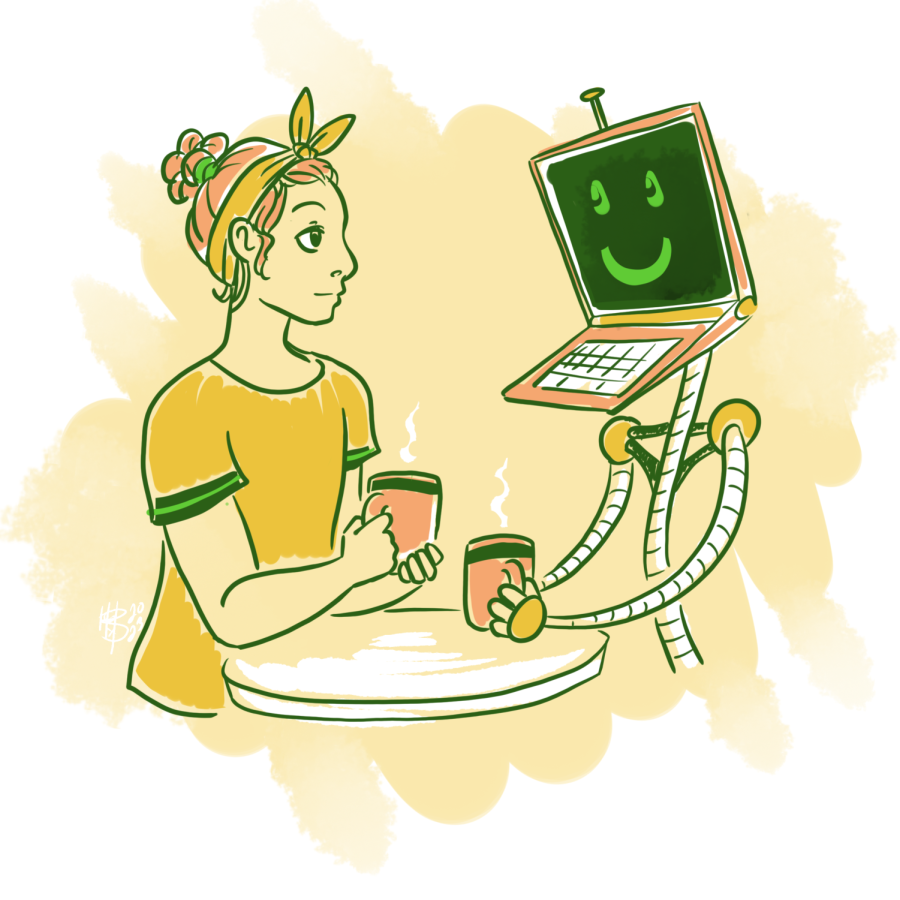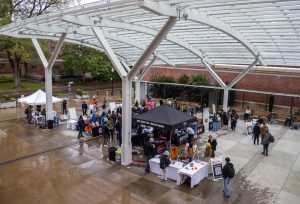Finals in the era of AI; ChatGPT poses complicated questions for OSU scholars
A student and ChatGBT enjoy a coffee break together.
March 9, 2023
ChatGPT, a state-of-the-art language model developed by OpenAI, has recently gained popularity among college students as a potential tool to help them with writing assignments. With its advanced natural language processing capabilities, ChatGPT has the potential to generate well-written and researched papers, making it a tempting option for students facing tight deadlines and heavy workloads during finals. However, the ethical implications of using AI-generated content for academic purposes raises questions about the impact on student learning and the future of education.
I did not write that first paragraph. ChatGPT did.
And if that first paragraph was screened through programs that Oregon State University uses to detect plagiarism, like say Turnitin, it would pass with flying colors. That’s because ChatGPT’s AI does not plagiarize. It writes in a similar way that we do, through synthesis. It processes information and regurgitates it onto the page, while cleaning up as it goes. In fact for many professors, the only thing that distinguishes AI writing from that of a human, is the rate at which it can be produced.
ChatGPT is a free and accessible website to everyone on campus provided the servers aren’t overloaded. Currently it’s being used all over the world to write for any application that can be thought up. That includes everything from high school essays on Macbeth, to monetized blog posts, to jumping off points for scientific papers and business plans. It’s changing the ways in which humans think and create.
Which all begs the question, with such a powerful tool available to all university students, what is OSU’s response?
“I know they’re working on policy,” said Evan Gottlieb, professor of English at OSU. “We [the Department of English] were told that the administration is going to put out a sort of University-wide statement.”
According to Gottlieb, the department was not given a time frame on when this announcement would come, despite the growing number of ChatGPT users on campus.
But with something as revolutionary as this technology, it’s safe to say that a statement, or a policy, has to be delivered before things get out of hand. Finals, after all, are here and with its stress could come desperation.
“It’s still in its infancy, but it’s a major technological achievement– in the same way that math professors have had to come to terms with the fact that students now use calculators,” Gottlieb said. “I don’t know a whole lot about their [OpenAI’s] design, but I know they use neural networks as their model for how the AI learns. In other words, I think their reproduction of a certain amount of human capability and even human methods of processing information is replicated in AI. It can be creative in the way it puts things together — but it has to be things that already exist.”
College English papers, and many other papers besides, are employed to showcase a students ability to synthesize information into a valid, and likely already existing, claim. Meaning, ChatGPT’s application wouldn’t be “iffy” or “in the ballpark,” it would be right in line with what the program is trained to execute.
All that being said, it seems we are on the cusp of something not yet identified. ChatGPT was released just over three months ago, and already the language model has reshaped Education systems, has been banned in several schools across the United States (including all of New York’s), and caused a controversial dilemma surrounding education on a scale we haven’t seen since the inception of the internet.
With these bans, it’s important to ask how productive they are— and if it’s even possible for them to succeed in what they are trying to do: maintain a literary and scholarly status quo in the face of something inevitable.
“I would hate to see us move to a model where in our efforts to avoid, to prevent students from using ChatGPT, we end up actually stripping down our curriculum,” Gottlieb said. “I would like to see ChatGPT become a tool to widen and advance the field of knowledge.”
ChatGPT has already arrived on campus, and it doesn’t seem to be going anywhere. Changes, solutions, and even just general experience with ChatGPT will come with time. Until then, we’ll just have to wait and see in which direction OSU (and humanity) are headed.






